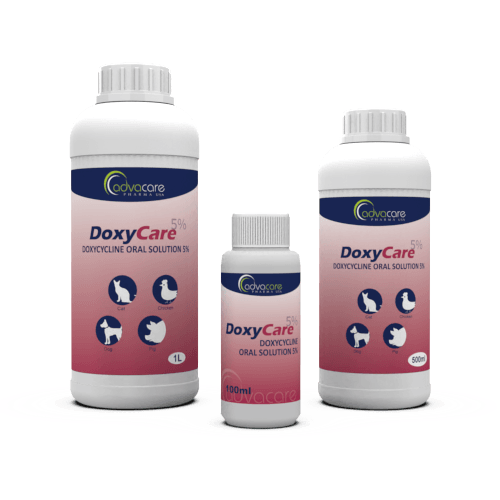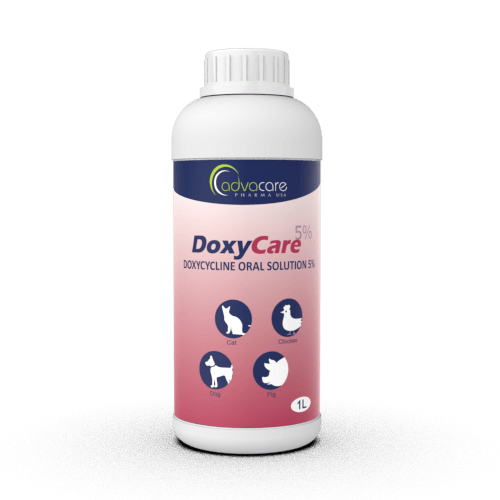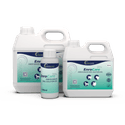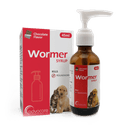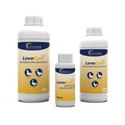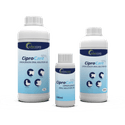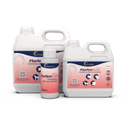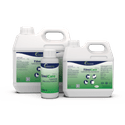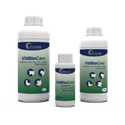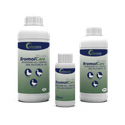- Home›
- Veterinary Pharmaceuticals›
- Veterinary Solutions and Suspensions›
- Veterinary Oral Solutions›
- Doxycycline Oral Solution
Doxycycline Oral Solution
Dosage
Packaging
What is Doxycycline?
Active Ingredients: Doxycycline
Doxycycline Oral Solution is a tetracycline antibiotic drug used to treat many types of infections in poultry, companion animals such as dogs and cats, and pigs. It is indicated in the treatment of many illnesses, including toxoplasmosis, leptospirosis, Rocky Mountain spotted fever, psittacosis, Mycoplasma, and Lyme disease.
Doxycycline is sometimes prescribed for upper respiratory infections and Methicillin-Resistant Staphylococcus Pseudintermedius (MRSP). It is also used in combination with other medications to treat heartworm infections.
Doxycycline belongs to the family of medicines called tetracycline antibiotics. It works by inhibiting the first stage of protein synthesis in the bacterial cell wall. Doxycycline is effective against many gram-positive and gram-negative bacteria.
Oral administration of doxycycline is commonly reserved for smaller animals like dogs and cats, but it can also be utilized in the treatment of larger animals such as horses or pigs. Doxycycline, a broad-spectrum antibiotic belonging to the tetracycline family, is derived from the fermented product of Streptomyces rimosus. Its effectiveness lies in inhibiting bacterial protein synthesis, demonstrating efficacy against both gram-positive and gram-negative bacteria, including pathogens like Mycoplasma pneumoniae, Diplococcus pneumoniae, and Escherichia coli. Additionally, it exhibits activity against Chlamydia, Rickettsia, and spirochetes.
Upon oral administration, the antibiotic is absorbed in the upper small intestine and distributed in the bloodstream within 2-4 hours. Factors such as sodium bicarbonate, aluminum hydroxide, calcium, iron, and dairy products can influence the absorption process. While doxycycline shows good oral bioavailability in dogs, its bioavailability is relatively poor in horses.
The antibiotic swiftly permeates various tissues and fluids throughout the body, attaining high concentrations in organs like the kidneys, liver, spleen, bone, bile, and lungs. Biotransformation in domestic animals is limited, and the drug is excreted without alteration. Excretion takes place through both glomerular filtration and the gastrointestinal tract, with influencing factors including the animal's age, route of administration, renal health, urine pH, and glomerular filtration rate.
Regardless of the chosen administration method or form, doxycycline is widely distributed and sequestered in the animal's body, particularly in the liver, kidney, bone, and dentine.
Tetracyclines undergo minimal metabolism in animals, and the drug is excreted unchanged through urine. It is advisable to conduct blood tests and urinalysis before initiating antibiotic treatment rather than during the treatment period.
This drug is also available in the form of soluble powder and injection.
It is important to note Doxycycline Oral Solution is for veterinary purposes only.
AdvaCare Pharma is a producer and exporter of Doxycycline Oral Solution. This livestock medicine is produced in our GMP-certified facilities in China, India, and the USA. These facilities are routinely audited to ensure they comply with health, safety, and environmental standards.
Why are we a quality Doxycycline manufacturer?
AdvaCare Pharma, an American company, is a quality manufacturer of Doxycycline Oral Solution for veterinary use. We are committed to the manufacture and global distribution of over 250 GMP-certified veterinary medicines, including 70+ oral liquid formulations.
As a trusted Doxycycline manufacturer, our approach to supply chain management is systematic and data-driven. We provide unparalleled support to our veterinary distributors, assisting with document and product registration, supply chain coordination and market share growth.
Uses
What is Doxycycline used for?
It's used to treat infections such as:
- Toxoplasmosis
- Leptospirosis
- Rocky Mountain spotted fever
- Psittacosis
- Mycoplasma
- Lyme disease
- Heartworm infection (adjuvant)
- Methicillin-Resistant Staphylococcus Pseudintermedius
What animals can be treated with Doxycycline Oral Solution?
This medicine is recommended for use in pigs, poultry, dogs, and cats.
How is a Doxycycline Oral Solution used?
This medicine has been manufactured as a liquid, which is intended to be administered orally. Oral administration via feed or drinking water is recommended. It is recommended to treat all animals at the same time. Whenever the Solution is mixed with feed, the product should be used immediately. Medicated drinking water should be used within 24 hours, and the water should be clean.
How can Doxycycline Oral Solution help animals?
This antibiotic merely curtails the bacteria’s ability to reproduce. For a successful treatment, additional therapy might be needed depending on the cause of the disease. The animals should be supplemented for a boosted immune system.
Many normal physiological barriers in the animal’s body cannot be crossed with certain antibiotics. This includes the nervous system, eyes, and prostate gland. These areas are sequestered, and infections there can hardly be treated. This antibiotic has the ability to penetrate these biological barriers and lead to better and faster recovery. It is very difficult to reach normal concentrations in the central nervous system, but it can reach the prostate gland barrier more easily and address the infections there.
This antibiotic is effective in treating Lyme disease (Borrelia burgdorferi), Feline infectious anemia (Mycoplasma Haemofelis), feline upper respiratory infection (Chlamydophila felis), tick-borne diseases (Ehrlichia and Anaplasma spp.), upper respiratory infections caused by Mycoplasma spp. And urinary infections. It is also efficient in treating brucellosis in animals, especially venereal diseases.
Doxycycline is also used in the treatment of heartworm infections, but it does not directly eliminate the worms. It targets the Wolbachia bacteria carried by the heartworms. Its elimination is crucial in heartworm treatment protocols, as this bacteria may increase the risk of complications like embolism during heartworm disease treatment. In dogs, this medication can be used for the treatment of Bordetella bronchiseptica, the primary agent causing kennel cough.
What are the other benefits of Doxycycline in animals?
Doxycycline also possesses immuno-modulating effects, making it efficient in managing immune-mediated diseases. This distinct effect is separate from its antibacterial action and is beneficial in treating conditions like:
- discoid lupus erythematosus
- plasma cell pododermatitis
- immune-mediated skin diseases
Combining doxycycline with the B vitamin niacinamide is often practiced to enhance outcomes in such situations.
How does Doxycycline help manage mycoplasma infections?
Mycoplasma infections are prevalent in dogs with compromised immune systems and those residing in kennels. These infections, caused by gram-negative bacteria lacking a cell wall, can result in gastrointestinal, respiratory, and reproductive complications. Kennel cough is a common manifestation in companion animals, leading to severe respiratory issues and an increased risk of secondary infections. Doxycycline, being effective against bacteria lacking a cell wall, serves as the optimal treatment for Mycoplasma infections, requiring administration in oral solution form for up to two weeks.
How should Doxycycline Oral Solution be stored?
This medication should be stored in a dark, dry location between 20 to 25 °C. The vial should be sealed tightly.
What is the withdrawal period for Doxycycline?
The withdrawal period for meat is 5 days. The exact duration will depend on local regulations.
Dosage
How much Doxycycline Oral Solution should be given to cats, poultry, and dogs?
The maximum dosage is 1ml/kg of body weight in cats and dogs and 0.15ml/kg of body weight in birds.
The dosage depends on the animal’s current health condition. The veterinarian should examine the animal before determining the dose. The dose also depends on the age and body weight of the animal.
Refer to a veterinary doctor or pharmacist for guidelines on dosage.
Side Effects
As with all pharmaceuticals, some unwanted effects can occur from the use of Doxycycline Oral Solution.
Some common side effects may include but are not limited to: • gastrointestinal effects (nausea, vomiting, diarrhea)
Serious side effects may include: • allergic reaction (skin rash, fever, facial swelling, or difficulty breathing)
This drug has an irritating pH and can become stuck in the esophagus if there is a foreign body present. This typically occurs in small companion animals. It can cause serious irritation that leads to a scar and difficulty swallowing.
Tetracyclines are not recommended for the treatment of animals with botulism as they already experience neuromuscular blockage, and the administration of tetracyclines could worsen their health condition.
Doxycycline has the potential to chelate calcium and bones, leading to yellow or brown discoloration. Excessive and frequent dosages can result in the fracture of the animal’s teeth.
Animals with liver issues should undergo examination before receiving doxycycline due to potential hepatotoxic effects, particularly in pregnant animals where the mortality rate is high.
Renal insufficiency in animals may lead to nephrotoxic effects when doxycycline is administered.
For a comprehensive list of all possible side effects of this medication, consult a veterinarian.
Precautions
Do NOT use Doxycycline Oral Solution for an animal that:
- has a known allergy or hypersensitivity to any of the ingredients.
- has a known allergy or hypersensitivity to other tetracyclines.
Treatment with this drug should be administered with caution for an animal that:
- is pregnant or lactating.
- has chronic gastrointestinal issues.
- has renal insufficiencies.
- has liver disease.
- is young or a neonate.
This medication has the potential to produce inaccurate readings of urine catecholamines and may result in a false-positive urine glucose reading when using Benedict's reagent.
Furthermore, as the drug is eliminated through feces, it might not be the most appropriate choice for patients dealing with chronic gastrointestinal issues.
Doxycycline should not be administered to pregnant and lactating animals. This is because the drug is excreted through milk, and residual traces of the medication can persist for up to 48 hours.
Before prescribing doxycycline, it is advisable for a veterinarian to evaluate patients with chronic kidney illness. Given that biotransformation and excretion primarily occur in the kidneys, these patients typically exhibit low rate of glomerular filtration.
The effectiveness and absorption of tetracyclines may diminish when taken concurrently with dairy products. Moreover, the activity of this antibiotic can be compromised if it is diluted in fluids and exposed to ultraviolet light.
There are known interactions between doxycycline and many other drugs, including anticoagulants, barbiturates, theophylline, insulin, bismuth subsalicylate, aminophylline, methoxyflurane, and cathartics.
This drug may affect the results of a glucose urine test.
What are the most common animals for which Doxycycline Oral Solutions is used?
Doxycycline oral solutions are primarily employed for the treatment of bacterial infections in animals and livestock. The specific common uses of doxycycline oral solutions include the treatment of the following diseases:
- Feline infectious anemia
- Lyme disease
- Feline upper respiratory infection
- Tick-borne
- Heartworm infection
- Respiratory and urinary infections
- Kennel cough
Poultry Bacterial Infections
Doxycycline is employed in the treatment of severe bacterial infections in poultry. This includes the management of Mycoplasma infections resulting from susceptible bacteria in the respiratory tract. Avibacterium paragallinarum can also be addressed with doxycycline. For conditions like Pasteurella multocida or Fowl Cholera, a combination of antibiotics and poultry supplements is typically administered. Doxycycline proves effective against various enteric infections in poultry.
Companion Animals Bacterial Infections
Doxycycline is an effective antibiotic in companion animals, addressing a range of respiratory, skin, gastrointestinal, and urinary infections. It is also capable of curing tick-borne diseases like Lyme disease. Doxycycline is utilized for the treatment of heartworm infections and kennel cough.
Swine Bacterial Infections
This antibiotic can be used for treating serious respiratory, gastrointestinal, or urinary infections in swine.

You might be interested in...
Why AdvaCare Pharma?
As an industry leader, we are aware of our responsibility to provide affordable and sustainable solutions to improve healthcare worldwide.
